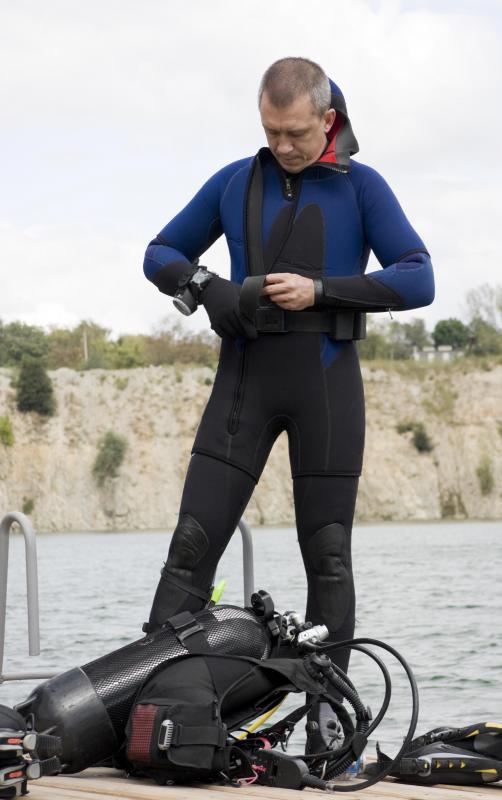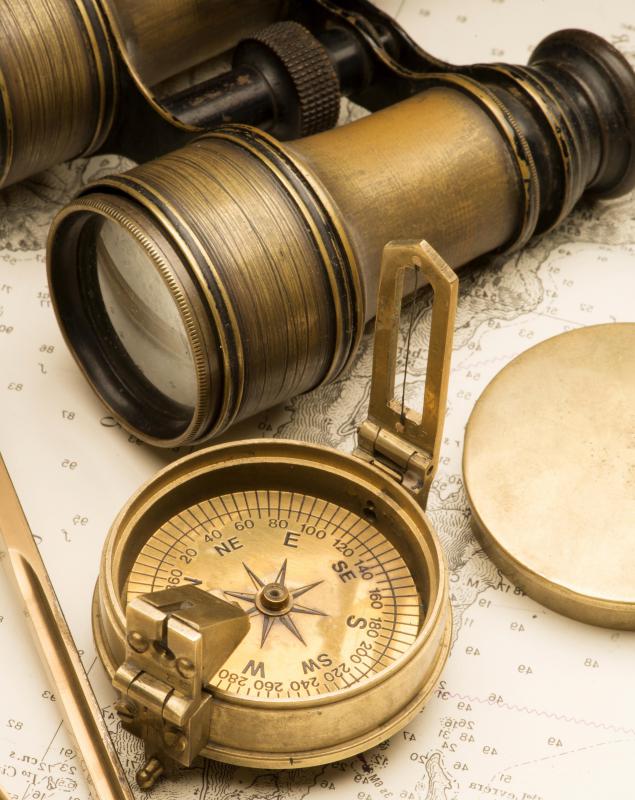At AllThingsNature, we're committed to delivering accurate, trustworthy information. Our expert-authored content is rigorously fact-checked and sourced from credible authorities. Discover how we uphold the highest standards in providing you with reliable knowledge.
What Should I Consider When Buying a Compass?
There are a number of important points to keep in mind when buying a compass. While it may be suitable, for recreational use, to find the cheapest compass one can buy, these are not acceptable for those who are depending on a compass for survival or for regular use. Also, the type of compass one uses may depend on what types of application it is being used in.
Many prefer to use a compass when hiking, especially if their adventures will take them away from the marked trails. In these applications, just any compass will not do. It is important to find one with a rectangular face plate and a declination adjustment.

The declination is one of the most important parts of the compass. While many believe that a compass points to the north pole, this is only partially true. It points to the magnetic north pole, which constantly moves and is not truly directly north for most of the world. Therefore, an adjustment is needed to make the compass totally accurate. Without a declination adjustment, the compass could be off as much as 30 degrees. Some compasses will have instructions for your location, but the U.S. government also has a Web site that can be used to find your declination adjustment.

The rectangular face plate is also important. It should be transparent so it can be overlayed on top of maps to provide a good understanding of where you are going and what may be along the way. This will provide good visual clues to help you keep on track.
Of course, for those who are not outdoors people, but simply like to keep track of their direction of travel while in a vehicle, there are also many different compasses to choose from. They normally sit on dash boards or stick to the windshield. These are not compasses in the truest sense of the word but do indicate direction of travel with some degree of certainty. Again, because these cannot be adjusted for declination, they are generally off to a certain degree.
For those who want a truly foolproof compass, most handheld GPS units offer a compass feature. This may be the most accurate "compass," especially if you have a waypoint you are trying to get to. The compass feature will always give you the general direction you need to go in order to reach your desired destination, once that destination is inputted into the unit. The unit will also indicate your general direction of travel.
Frequently Asked Questions
What are the essential features to look for in a good quality compass?
A high-quality compass should have a stable, easy-to-read needle, a rotating bezel with clear markings, and a baseplate with straight edges for map work. Durability is key, so look for a waterproof and shock-resistant design. Additionally, consider a compass with declination adjustment for accurate navigation and a sighting mirror for precise bearings.
How important is declination adjustment in a compass?
Declination adjustment is crucial for accurate navigation as it compensates for the difference between magnetic north and true north. According to the National Oceanic and Atmospheric Administration, declination values can change over time, so an adjustable compass ensures ongoing accuracy, especially in regions with significant magnetic variation.
Is there a significant difference between a digital and an analog compass?
Yes, digital compasses provide electronic readings and often include additional features like temperature sensors and altimeters. However, they require batteries and can be less reliable in extreme conditions. Analog compasses, on the other hand, are more durable and do not rely on power sources, making them a preferred choice for many outdoor enthusiasts.
What type of compass is best for beginners?
Beginners should opt for a user-friendly, baseplate compass with clear markings and a simple design. It should have a transparent base for easy map reading and a lanyard for portability. A model with an instructional booklet or reference guide can be particularly helpful for those new to navigation.
Can a smartphone compass app replace a traditional compass?
While smartphone compass apps are convenient, they are not as reliable as traditional compasses. They can be affected by electronic interference and are limited by battery life. For serious navigation, especially in remote areas, a traditional compass is recommended for its dependability and accuracy.
How does the size of the compass affect its usability?
The size of the compass can impact its usability; larger compasses often have more features and are easier to handle, which is beneficial for detailed navigation. However, they can be bulkier to carry. Smaller compasses are more compact and lightweight, ideal for quick reference and minimalistic adventures. Choose based on the balance between functionality and portability that suits your needs.
AS FEATURED ON:
AS FEATURED ON:












Discussion Comments
For me the biggest thing to consider is the size. It is pretty easy to find extremely small compasses these days, often with all the orienteering marks you need. In some cases these are even built into other tools you might need like a multi-tool or a flashlight.
A compass is great to have and usually light weight, but lots of people end up carrying more compass than they need. If you are trying to maximize the space you have at your disposal and minimize the number of things you carry think about downsizing your compass.
One important thing to consider is the durability of the compass. You will mostly be using your compass in rugged outdoor conditions. If you have a cheap plastic compass there is a good chance it could be broken when your backpack rolls over onto it or you slip on the trail.
Trust me, I learned this the hard way. I was hiking with a friend of mine and we had one compass between the two of us. It was a really cheap old compass that I bought for less than 2 dollars. Long story short, I dropped the compass, accidentally stepped on it and broke it into about a hundred pieces. We were able to make it out of the woods but it was sketchy there for a while. Do yourself a favor and buy a compass that will stand up to the beating you will probably give it.
Post your comments